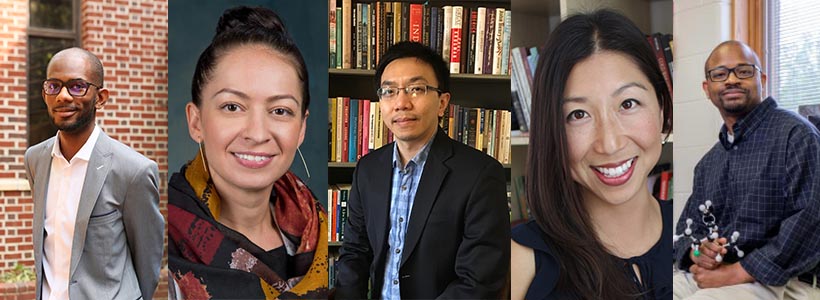Innovation in Postsecondary Teaching
Beyond the Lecture Hall: Fellows Bring Excellence and Innovation to Postsecondary Teaching
Share

Applications for the earliest Woodrow Wilson Fellowships stated, “The Foundation exists to recruit for the teaching profession at the college or university level.” Since 1945, generations of great undergraduate and graduate teachers have started their careers as Fellows. A handful of current WW fellowship programs continue to emphasize outstanding teaching—an art that demands as much attention as disciplinary mastery and, today, extends well beyond the traditional lecture hall.
Several recent Fellows emphasize that excellence in contemporary teaching requires building an inclusive venue for learning. “I do so by creating opportunities for the students to be part of the conversation, providing them with a supportive environment to learn from and to be in dialogue with each other, empowering them to find their own voices and draw from their own experiences, and challenging them to listen deeply to others who might hold views different from their own,” says Van Tran NWM ’18, an associate professor of sociology at The Graduate Center, CUNY.
“As instructor, I do not act as an all-knowing keeper of knowledge,” says Eddie Cole NWM ’17, an associate professor of higher education at William & Mary. “Instead, I facilitate discussions that bring all voices to the conversation. This lays the foundation for creating an inclusive learning environment—one that welcomes diverse experiences—and empowers students to share their unique perspectives.”
For Dwight Williams CH ’19, an assistant professor of chemistry at Kalamazoo College, student success depends on an environment that takes into account the needs of all types of learners.
“I have designed my course around mastery not only of the content but in the cultivation of an intellectual toolbox that encompasses the skills of working collaboratively, communicating effectively, learning autonomously, and applying knowledge to solve complex problems,” says Dr. Williams. “I believe that through these efforts, students are learning how to learn, which is a skill that all lifelong learners must possess.”
Others emphasize the value of thoughtful discussion as itself a learning experience. “Preparing diverse student populations to become ethical leaders and socially responsible citizens is a core tenet of my [teaching] philosophy,” says Ekaterina (Kate) Elgayeva CH ’19, assistant professor of organizational behavior at the University of Minnesota, Duluth. “Using student-centered approaches to learning, I create a supportive environment for constructive dialogue.”
Susie Woo NWM ‘17 relies on a variety of sources—from court cases to comedy sketches—to engage her American studies students. “I aim to instill in students the confidence that their ideas matter,” she says. “This begins in the classroom by listening to each student and fostering discussion between them, continues through engagement with their written work, and hopefully carries over when they apply classroom skills to their everyday lives outside of school.”
Drs. Tran, Cole, and Woo are recipients of the Nancy Weiss Malkiel (NWM) Scholars Award (recently renamed the Mellon Emerging Faculty Leaders Award), which supports excellence across the portfolio of research, service, and teaching/mentoring. Drs. Williams and Elgayeva are Course Hero-Woodrow Wilson Fellows for Excellence in Teaching (CH).
These Fellows also emphasize a variety of methods to engage undergraduates, in particular. “Students might do public service, research fieldwork, community-based research or work internships in conjunction with in-class work,” says Dr. Tran, who seeks to help his students connect their coursework to their lived experience in New York City.
Dr. Elgayeva turns to technology, combining a variety of online platforms to create “face-to-face, hybrid, and online modalities to deliver high quality instruction…with experiential exercises in active listening, perception, and change management, among others.”
Even more fundamental to good teaching, perhaps, is connecting with and understanding students and their particular challenges. “I think it’s critical that we serve as resources for our students for whom the path to graduation is too often riddled with barriers,” says Dr. Woo. “Students need and deserve mentors who will help them reach graduation and beyond.”
“Many faculty from minority backgrounds often take on a disproportionate share of teaching, advising and service responsibilities,” notes Dr. Tran. “As a result, we perform a tremendous amount of emotional labor… The [Mellon Emerging Faculty Leaders Award] not only recognizes the many tasks we perform as valuable, but also validates the importance of mentoring the next generation of scholars which many of us deeply believe in.”
As a historian, Dr. Cole looks to the past to understand what the demands of the future might be on higher education. “The future of good teaching will depend on the ability of faculty to deliver content in a manner that speaks to learners’ lives in a way that pushes us all closer to the world we want to see,” he says. “That future—one where teaching invigorates change through learning—is exciting, and I want my work to be part of the shift that will usher this change into reality.”
Stay Engaged
Get More News
Join our mailing list to get more news like this to your mailbox.
Support Our Work
Help us invest in the talent, ideas, and networks that will develop young people as effective, lifelong citizens.
Ways to Support Us